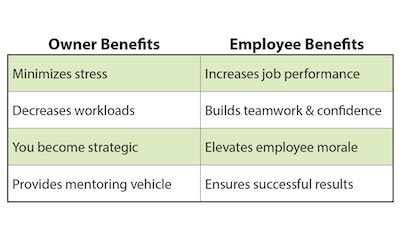Many owners experience burnout at some point in their career. In the remediation industry we don’t have to look far for causes: slow AR’s, elevated demands from TPA’s and insurance companies, unrealistic property owners, frivolous law-suits, etc. The industry has always been challenging, becoming more so the last decade.
Regularly I hear from owners whose first comments sound like this, “My name is Bob… been at this for a lot of years. Ya know, it’s not the same industry I started in. I’m tired… don’t think I’m up for the fight anymore. How quickly can you get me the @&%# out of here?”
Can you relate? On any given day many can.
A key question should then be, “How do I avoid burnout?” Answers may add years to your career, plus well-deserved happiness along the way. Below are 6 essential tips to help avoid burnout.
1.) Delegate Effectively
Owners who struggle to delegate effectively will forever work in their business, not on it. This often means a sales ceiling of $1.5M – $2.0M, with little hope of getting beyond it as the owner is wearing 10-15 hats, when they should be wearing 5 or less.
Effective delegation is not barking orders then blindly trusting someone to follow them. The 6 basic steps for effective delegation are simply and clearly detailed in a short book by Donna M. Genett, Ph.D., “If You Want It Done Right, You Don’t Have to Do It Yourself.” The steps are quick to learn, effective, and essential for many owners.
Benefits of delegating effectively are readily visible and proven:

According to Greg of Greg Neil Associates, “With effective delegation a ‘team centric’ culture will follow. It’s surprising for most owners how quickly key employees will grasp the added responsibility- taking ownership, being accountable and making better decisions. Isn’t that the goal?”
2.) Get Expertise When You Need It
Every owner has their core strengths. However, most are not skilled in every aspect of managing a complex business. There is nothing wrong with the adage of ‘playing to our strengths’, but many take this as license to ignore their weaknesses. The decisions associated with weaknesses are often delayed, or even ignored. A slippery slope when critical decisions need to be made.
For any aspect of the restoration industry there are many resources and consultants available. When we can admit ‘what we don’t know’ and get solid answers, our stress decreases and confidence increases. Admitting the need for help is a stumbling block for many owners.
3.) Know Your Numbers
Occasionally I communicate with owners who still rely on their gut when it comes to their numbers- margins, cost allocations, WIP, any number of ratios, etc. When asked even basic questions, it becomes apparent they don’t know.
There are a handful of key numbers (KPI’s) which should be monitored regularly. Industry specific software is terrific for determining exactly where you stand at any given moment. Even basic software can generate crucial figures.
The key is wanting to know, then knowing what to do if they are out of alignment. There’s far too much at stake to ignore your numbers.
4.) Prioritize Your Day
Restoration contractors can easily get frustrated over their ‘work-life balance’, pointing to the industry itself. Yes, it can be overwhelming, but it doesn’t need to be.
When we truly prioritize, we get to schedule our priorities, not just prioritize our schedule. (Digest that last sentence slowly, there is a massive difference.)
To further drive the point home, according to Jack Welch, “There’s no such thing as work-life balance. There are work-life choices you make… and they have consequences.”
We control our schedules, nobody else. We can either own it by taking control, or continue reacting to the daily demands that will always find us if we let them.
5.) Remember What You Value
How long has it been since you looked in the mirror and took inventory of your values? Not just thought about them, but assessed and prioritized them. (Oops, there’s that word again!) With the day-to-day routine of work we often lose touch, or worse yet, forget, what we value most.
Please take a minute to consider an important question- what are your top 5 values? And, do your actions and schedule reflect that list? If there are individuals on this list, do they know where they stand? Or, will they know ‘someday’?
As a business owner for 25+ years, one crystal clear observation is this- when our values are clear, making key decisions becomes easier.
6.) Schedule Down Time
If you’re like most owners, your schedule is overflowing. How effective and strategic are you while running at >100% capacity? Nearly impossible.
Marty Jocz, President of Coach, Teach and Train, Inc. says, “Many restoration owners don’t know how to handle down time. A new client just told me he hadn’t had a vacation in 7 years because, ‘no one else could do it’. For their health, owners need to set clear boundaries for getting away or they won’t even know burn-out is rapidly approaching!”
Here’s a great trick- pencil in 30 minutes a day just for strategic down time. Go for a drive or a walk, the important thing is to get away and clear your mind. To be effective, it needs to be scheduled as if it were a critical meeting- which it is.
It’s not a vacation, but with a little practice it will quickly become the most valuable 30 minutes of your day to strategize, problem-solve, and gain clarity on the rest of your business.
Following the tips above is no guarantee you’ll avoid burnout. However, ignoring them is a virtual guarantee you’re headed straight for it.
